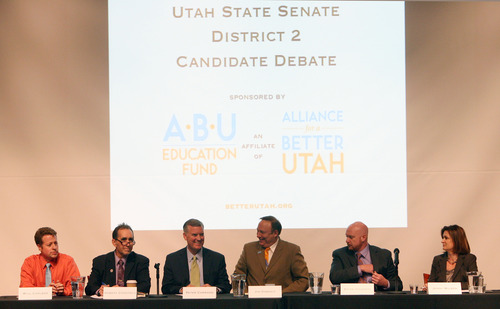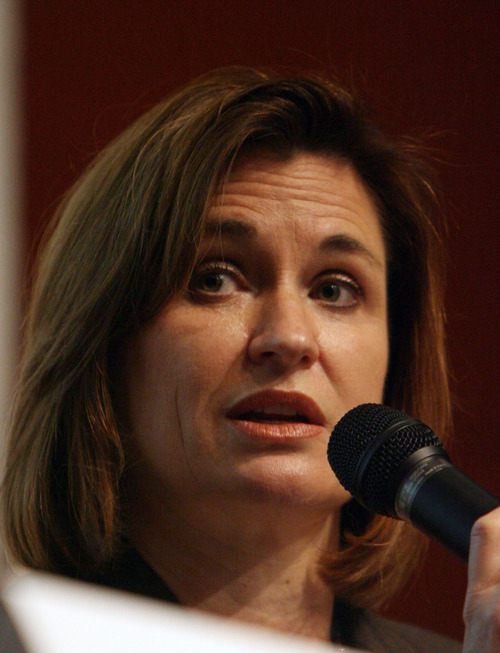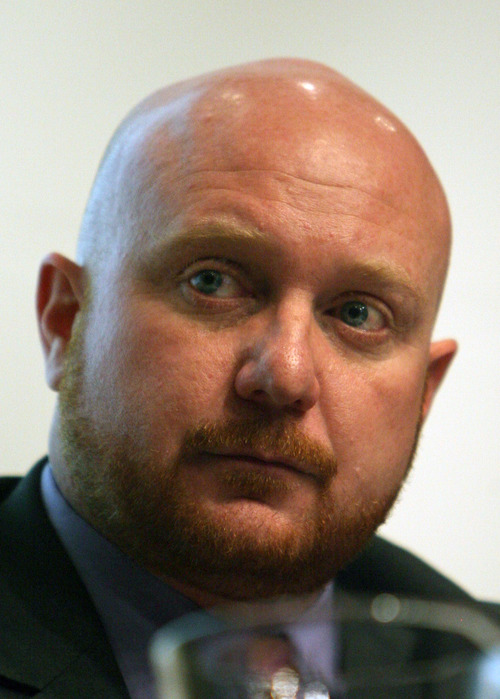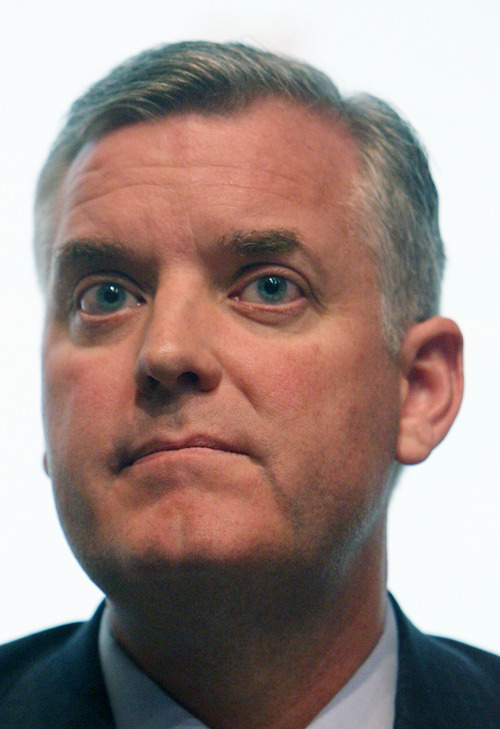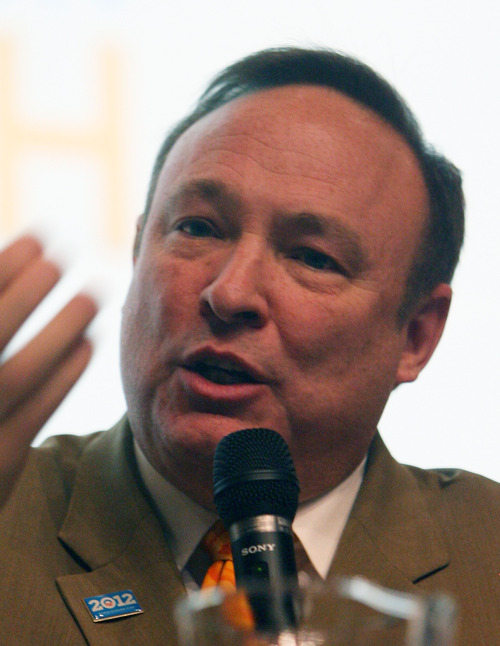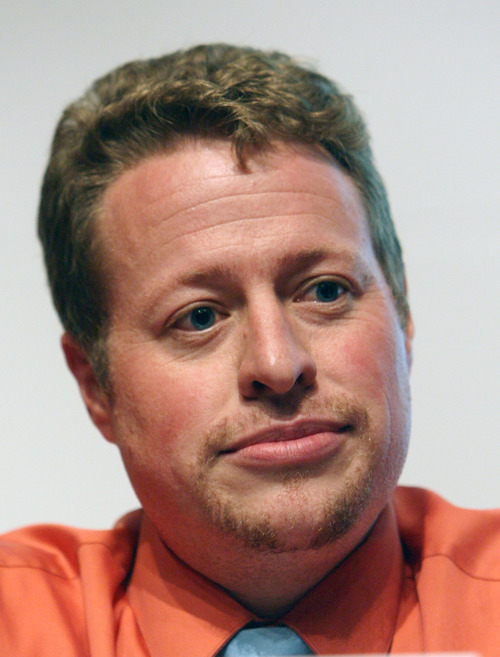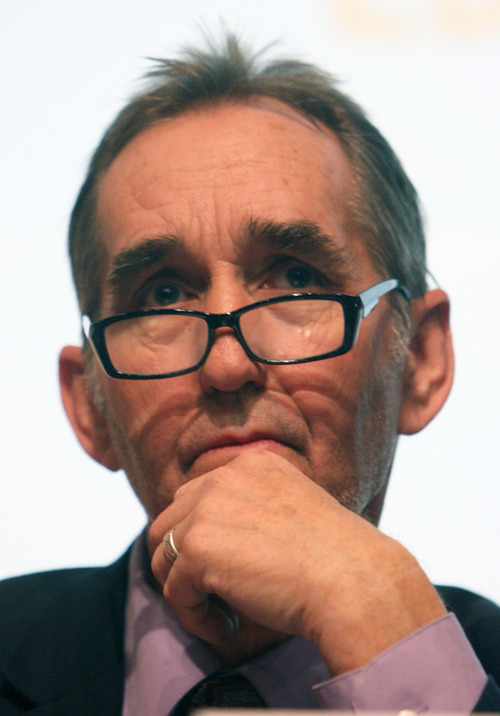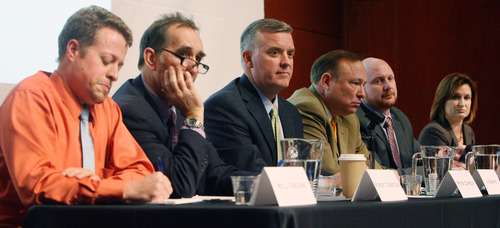This is an archived article that was published on sltrib.com in 2012, and information in the article may be outdated. It is provided only for personal research purposes and may not be reprinted.
This is how tough it's gotten for Democrats in Utah — there were more candidates battling in a debate Tuesday night to replace Ben McAdams in his vacated Senate District 2 seat than there will be actual Democrats in the Senate chamber when the session begins in January.
That prompted candidate Will Carlson to lay it out in stark terms.
"Compromise is something you do when you have a seat at the table," he said. "Unfortunately, Democrats have been on the table for far too long."
The six candidates tackled a wide array of topics, including education funding, gay marriage, abortion rights, immigration, federal lands and Medicaid during the 90-minute contest that saw very little in the way of attacks against each other and more than a few swipes at Republicans, who will open the Legislative session with a 24-5 advantage.
The niceties between the candidates started with current Utah Democratic Party Chairman Jim Dabakis using his entire opening statement to praise each of his rivals for the seat. It ended with Salt Lake County Mayor Peter Corroon using the same tactic in his closing statement.
"Whoever you pick, you'll have picked a great person," Corroon said.
The debate before about 150 people at the University of Utah was the first showdown for the candidates hoping to replace McAdams in a special election set for Saturday. McAdams left his seat to run for Salt Lake County mayor and defeated Republican Mark Crockett in the November election.
Max Roth, a Fox 13 reporter, moderated the debate and — mindful of the party's diminished status in the chamber — asked each of the candidates if they would be a firebrand in the Senate or would they work to get along with the Republican majority to try and get things accomplished.
While each said there was a time and place for both approaches, Dabakis went hard at the GOP majority on education, noting that Utah ranked at the bottom of per-pupil funding and referenced recent data showing Utah ranking 31st in graduation rates.
"On education, there is only one way to change what is going on in education. We have to shame and embarrass the Republicans," Dabakis said. "They need to stop saying we're great on education."
Jenny Wilson, a former Salt Lake County Council member and the lone woman in the race, said she had worked in a bipartisan way to get things accomplished — including fighting to get same-sex benefits in Salt Lake County.
But it was on the issue of abortion that she grew emotional, her voice hitching as she talked of knowing people facing that issue as the Utah Legislature passed a law earlier this year requiring a 72-hour waiting period for abortions. She also said she was "horrified" by Mitt Romney's stance on the issue.
"I will always fight on this issue," she said. "It is a difficult issue and while these men are enlightened — and I appreciate that — but that's not always the case. But this is an issue I … will never compromise on."
Brian Doughty touted his legislative experience at several points during the debate. He was appointed to replace Jackie Biskupski in the House in 2011. Doughty lost his bid to retain a House seat to Angela Romero earlier this year.
All of the candidates opposed a proposal to reinstate the sales tax on food, with candidate Robert Comstock calling it "regressive" and damaging to the poor.
The candidates also appeared wary on the issue of immigration.
Knowing Utah's guest worker law, HB116, is set to take effect in July and that the Legislature is likely to tackle it this session, the candidates were asked how they would address it, and each worried about the federal government suing the state. All said immigration must be dealt with by the federal government.
The Utah law, which would allow illegal immigrants in the state to pay a fine and obtain a guest worker permit issued by the state, would be in immediate danger of being declared unconstitutional according to legislative analysts.
Corroon, who signed The Utah Compact — the document of guiding principles that helped push HB116 — said he "liked the idea" but feared the state was overstepping its authority with the issue.
Candidate Jon Watkins did not show up to the debate.
The debate will be available at betterutah.org and there are links at fox13now.com.
Twitter: @davemontero


